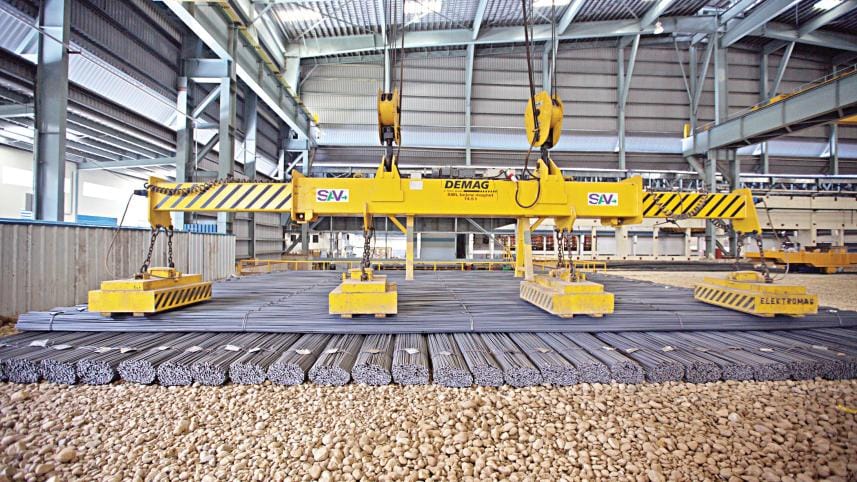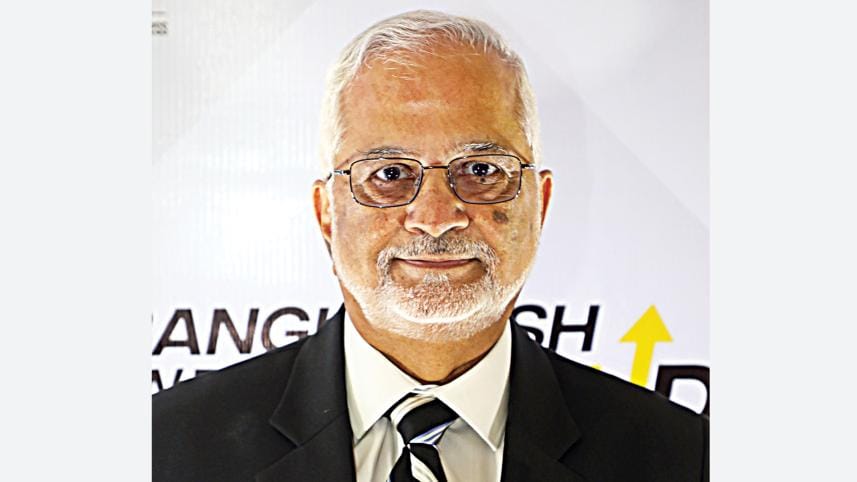Rise of the steel giant

Although the steel industry is crucial for developing modern economies, Bangladesh was completely devoid of one until the year 1952.
Three or four merchant families hailing from Gujarat in India had established separate small-scale manual rod making plants in Chattogram that year, sowing the seeds for the domestic steel industry.
However, only the family of Akberali Africawala, who founded the first unit of BSRM Group, has succeeded over the years.

This is because what Akberali and his brothers set in motion back then has been continued by their children and grandchildren, with their dedication and innovative ideas transforming the Bangladesh Steel Re-Rolling Mills Ltd (BSRM) into the country's leading steelmaker.
With a passion for harnessing unexploited opportunities and relentless efforts to provide high-quality specialised steel products, Akberali's third son Alihussain Akberali has played an immense role in this regard.
Alihussain together with his son Aameir Alihussain, his cousin Zohair Taherali and nephew Abdul Qadir Zohair have cemented BSRM's position as a market leader, bringing about ground-breaking changes to the steel industry in Bangladesh.
Now, the BSRM chairman is considered among the most experienced industrialists in the country and is even hailed as a "Steel Guru" for his vast expertise in the vital sector.
Aameir Alihussain, the current managing director of BSRM, recently shared the fascinating story behind the group's long journey to success.
HISTORY
Akberali's father Alibhai Khanbhai, a clothing trader from Amreli in Gujarat, was among several Gujarati merchants who had travelled to Madagascar in Africa prior to 1900 to make a living.
Alibhai returned to his homeland in 1930 and engaged in trading hardware and silver products.
But following the partition of India in 1947, the family gradually migrated to West Pakistan and started a hardware business in Karachi.
It was through this hardware business that Akberali and his brothers started frequently visiting Dhaka to trade nails and screws.
HOW IT STARTED
"It was during one such visit that my grandfather and one or two of his brothers decided to tour Chattogram, where they fell in love with the region's greenery, weather and iron-rich water," Aameir said.
Seeing an opportunity, Akberali decided to anchor their hardware business in the country and opened an office on Jubilee Road in Chattogram in 1949.
Akberali had sensed the prospect for steel production in Bangladesh as the country was completely lagging in this regard compared to India, where the industry was already well established.
"Being of Indian origin, our family had good connections with industry people in the neighbouring nation and used those connections to their advantage," Aameir said.
Then in 1952, Akberali and his four brothers -- Taherali Africawala, Abdul Hussain Africawala, Rajabali Africawala and Ghulam Hussain Africawala -- established the East Bengal Re-rolling Mill in Nasirabad, Chattogram.
Following the Liberation War, their steel plant, business properties and assets were nationalised but Akberali and Taherali stayed in Bangladesh as they had a deep love for the new country.
"The government gave back our assets within two years but since there was a gap, they had to start over and the plant was renamed as Bangladesh Steel Re-rolling Mills [BSRM]," Aameir said.
NEW JOURNEY
Akberali's third and youngest son Alihussain had got a job offer from Saudi Aribia's Aramco after completing his chartered accountancy in West Pakistan in 1972. But honouring his father's wishes, Alihussain joined the family business.
In the years that followed, Alihussain, his brothers, uncles and cousins led the plant's transition from a small manual rolling mill to one that produces global quality products.
The country's construction sector saw some pace in the 1980s, which helped the industry's rise.
"The family kept making gradual investments, modifying the plant to increase its product range. For the next 15 years, they kept innovating, researching and developing new products," Aameir added.
By 2001, Aameir joined the business after completing his graduation in economics from McGill University in Canada and an MBA from LUMS University in Lahore.
Alihussain, his son Aameir and cousin Zohair then planned for steady expansion to grab the rising market with a persistent hankering for more advanced technology.
The annual production capacity of BSRM's old re-rolling plant in Nasirabad, which was merely 36,000 tonnes in the 1980s, was gradually increased to 1.20 lakh tonnes till 2008.
That same year, the group set up a new plant at Fouzderhat with brand new automated equipment imported from Italy to produce the country's first 500-grade steel bars, bringing a dynamic change to the local market.
Aameir also said that afterwards, they went for continuous upgradation and expansion in terms of quality, efficiency, production capacity, and developing specialised and diversified products.
According to him, BSRM Group saw its real exponential growth after 2008 in line with the country's steady economic growth.
"We kept expanding production as the market kept growing," he added.
By the year 2022, with two rolling mills and four billet making plants, BSRM's combined annual production capacity of mild steel rod and billet each reached about 1.8 million tonnes.
As a part of exploring new opportunities, the company in 2018 set up a unit in Mirsharai of Chattogram to make various products, such as galvanised wire and welding electrodes.
Then came the blow of the Covid-19 pandemic, followed by the Russia-Ukraine war.
Still, the leaders remained optimistic over the past two years and initiated the massive expansion of one of its billet plants and set up a greenfield rolling plant in Mirsharai.
BSRM has invested around Tk 2,100 crore in these two projects.
"We were hopeful about more opportunities in the coming years. Moreover, we were running at full capacity, so we can take the challenge," Aameir said.
With the billet factory expansion project having ended last year, BSRM's combined billet production capacity has reached 2.4 million tonnes.
Also, the new rolling plant will add 6 lakh tonnes to its mild steel rod production capacity, with the combined capacity now at 2.4 million tonnes per annum.
However, the factory is currently in the commissioning stage.
BSRM registered net profits of Tk 589.3 crore in fiscal 2022-23, when its overall sales revenue was Tk 19,958.6 crore.
At present, the company employs more than 4,500 people and is considered a "university" for steelmaking, as many of its workers go on to hold leading positions at other steelmaking companies.




 For all latest news, follow The Daily Star's Google News channel.
For all latest news, follow The Daily Star's Google News channel.
Comments